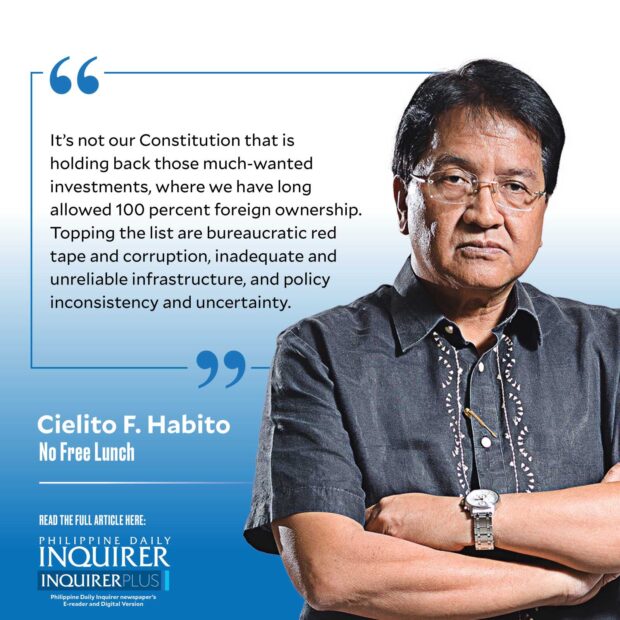Is economic Cha-cha urgent?

Should the Philippine Constitution be amended to ease its restrictive economic provisions, particularly on foreign ownership and control of certain economic activities? Yes. Is it so urgent for this to be done now, and have our lawmakers spend precious legislative time on it? No—and let me explain why.
What are those economic restrictions that our legislators are suddenly so gung-ho about amending now, and yet barely three years ago, they and the President didn’t consider it a priority? It’s about foreign ownership in five things: land, public utilities, mass media, advertising companies, and educational institutions. Only Filipinos or entities with at least 60 percent Filipino ownership are allowed by the 1987 Constitution to own land in the Philippines. Foreigners may legally own a house, but not the land on which it sits. They may own a condo unit, provided that at least 60 percent of the building is owned by Filipinos. However, foreigners may lease land, hence effectively control it, for up to 50 years, via a lease of 25 years renewable for another 25. Mass media is exclusively for Filipinos and corporations, cooperatives or associations entirely owned and managed by Filipinos. In the advertising industry, at least 70 percent ownership and control by Filipinos is required, while the minimum is 60 percent for educational institutions, as well as public utilities.
I have no problem with keeping land ownership restricted, and by all indications, neither do foreign investors. They have flocked to Vietnam big time, even with similar restrictions on land ownership, settling for long-term leases like ours. While Thailand, Malaysia, and Indonesia do not bar foreigners from owning land outright, their rules make it difficult, and long-term leases still tend to be the favored recourse of foreign firms locating there. Even our foreign chambers believe that opening land ownership to non-Filipinos would drive land values beyond the reach of common Filipinos, and none of us wants that.
Article continues after this advertisementFor mass media (which appears excluded from the Senate’s targeted amendments), advertising, and educational institutions, I’ve long argued that technology has rendered foreign ownership restrictions pointless. With the spread of cable TV and global media networks in the 1990s, then the onset of the internet, social media, and artificial intelligence, such restrictions no longer protect us from “brainwashing” by foreigners, as seemingly feared by our Charter framers. Experience around the world has shown how election outcomes could be shaped from overseas through deliberate social media manipulation. Meanwhile, we missed out on being chosen to host branches of top-rate universities like Yale and Johns Hopkins, and regional bases of large global media networks, which set up shop in Singapore, Malaysia, and Indonesia.
Public utilities have already been substantially opened up since 2022 by Republic Act No. 11659 amending the Public Service Act of 1936 and dramatically reducing the previously long list of industries defined as public utilities to align with international definitions. There is little left that opening up would draw in foreign investors, and imbued with public interest, these are arguably better kept restricted for national security reasons.
All told, then, what could we gain by easing constitutional foreign ownership restrictions now? We would be opening our doors to foreign advertising firms, schools, and mass media branches. And if we completely open public utilities (which is debatable), we might also get foreign public transport providers, and distributors of power, water, and gas. But would they come rushing in, especially now? Note how these are all in the services sector, already dominant in our economy where it’s manufacturing investments that we direly need to create more plentiful quality jobs. With China’s economy now often described to be showing cracks and quickly losing attractiveness as an investment host, we must lure large manufacturing investors that are either exiting China or eyeing a nearby alternate production base. And it’s not our Constitution that is holding back those much-wanted investments, where we have long allowed 100 percent foreign ownership. I wrote a few months ago on the most commonly cited deterrents by foreign investors in the Philippines (“Why investments elude us,” 10/10/23). Topping the list are bureaucratic red tape and corruption, inadequate and unreliable infrastructure, and policy inconsistency and uncertainty. Fixing these is the homework we need to work on first, without which amending the Constitution’s economic provisions will yield no effect.
Article continues after this advertisementThat’s why the more our politicians keep barking up this false tree, the more I’m convinced that it’s self-serving amendments to the political provisions they’re really after.
cielito.habito@gmail.com
















